
25 Nov 2024
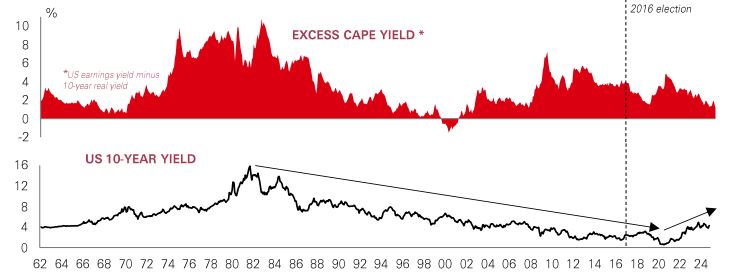
Over the previous week, risk markets have paused for breath. US stocks have unwound some of their big post-election gains, high-yield credit spreads have picked up from multi-year lows, and commodity prices have lost ground.
We think recent market action reflects a new reality facing investors. There is a “tug of war” between enthusiasm around significant aspects of the US policy outlook – mainly deregulation and tax cuts – versus concerns about the potentially stagflationary effects of loose fiscal policy and an acceleration of the trend in US isolationism.
US 10-year yields are hovering just below April’s year-to-date highs despite the Fed now in easing mode and inflation in a holding pattern, with room for more disinflation in 2025. This is because there is now much greater uncertainty around the inflation outlook, reflected in the recent pick-up in the US term premium.
Structurally higher inflation and interest rates pose many challenges for investment markets. It weighs on the growth and earnings outlook. And it makes stock valuations less attractive versus bonds. The most expensive parts of the stock market such as US mega-cap tech – which look priced for perfection – could be vulnerable.
Four years after being badly hit by Covid travel restrictions, air traffic has finally caught up with 2019 levels – but the global aviation industry’s cyclical and structural growth drivers are changing.
A new research explores the sector’s investment outlook – with a focus on airports, which are a key part of the infrastructure asset class. Overall demand looks robust, but new trends in the traveller ‘mix’ and geographic growth are emerging. While business travel continues to decline, demand from cohorts travelling for leisure and ‘visiting friends and relatives’ is growing quickly. And in terms of regional demand, industry forecasts suggest that fast-growing developing nations will contribute 85% of the industry’s growth over the next 20 years – with Asia Pacific expected to be a powerhouse.
For airport investors, post-pandemic challenges are giving way to new opportunities, with wealth and demographic trends expected to drive above-GDP growth rates for the industry. Together with offering a wider range of travel destinations, there are opportunities for airports to enhance returns with a wider range of premium services.
The value of investments and any income from them can go down as well as up and investors may not get back the amount originally invested. Past performance does not predict future returns. Investments in emerging markets are by their nature higher risk and potentially more volatile than those inherent in some established markets. The level of yield is not guaranteed and may rise or fall in the future. For informational purposes only and should not be construed as a recommendation to invest in the specific country, product, strategy, sector or security. Any views expressed were held at the time of preparation and are subject to change without notice. Any forecast, projection or target where provided is indicative only and is not guaranteed in any way.
Source: HSBC Asset Management. Macrobond, Bloomberg. Data as at 7.30am UK time 22 November 2024.
With Q3 earnings season drawing to a close in the US, last week saw results from the market’s most closely-watched technology giant, NVIDIA. Like the rest of the S&P 500’s ‘Magnificent 7’ tech stocks, NVIDIA’s quarterly profits were ahead of analyst forecasts for the quarter. Indeed, with more than 90% of companies in the index having reported, around 75% of them have beaten profit expectations.
However, the scale of index-wide profits beats – averaging about 4.3% above estimates, according to Factset – is roughly half that of their 5-year average. Firms may be finding it harder to beat forecasts. And given the index trades on a price-to-earnings ratio of 22.3x (versus its 15-year average of 16.4x), prices could be vulnerable if future earnings disappoint. The communication services, IT and healthcare sectors have seen the largest (aggregate) beats, while energy and materials have seen the largest (aggregate) misses.
From here, profit growth expectations remain high into 2025. But against a backdrop of policy uncertainty and a cooling economy, any weakness could lead to heightened volatility.
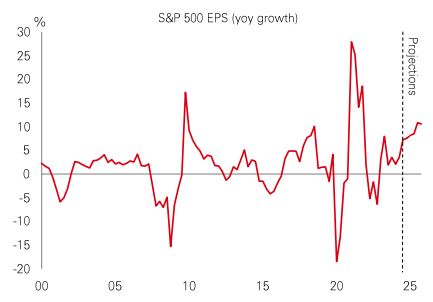
US stock buybacks have boomed in recent years as companies looked to boost earnings-per-share, buoy their valuations, and allocate cash to reward shareholders. Against a backdrop of falling rates – dampening returns on cash holdings – this popularity should persist. But this isn’t just a US phenomenon – Asia stock markets have seen a buyback boost too.
A key difference in Asia is that buybacks have been driven by regional efforts to improve corporate governance. Governments have called on firms to be more investor-friendly and improve their valuations. Japan is a prime example, and is now seeing a third consecutive year of record buybacks in 2024. A similar move in South Korea – the ‘Value-Up’ programme – saw a 25% rise in buybacks in H1-24 from H1-23. Mainland Chinese authorities have also demanded action on profitability and shareholder returns. Share repurchases there are on course to break domestic records this year, with September’s stimulus measures including a RMB300bn relending facility earmarked specifically for share buybacks.
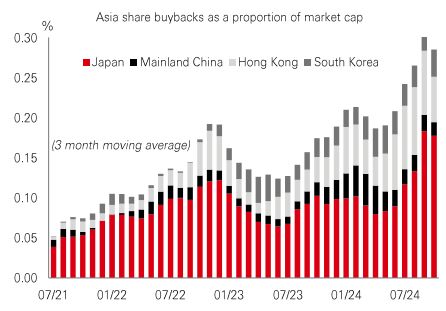
Recent action with the US dollar looks to be following the 2016 playbook. The DXY index or “dixie” is up around 3-4% since the US election, about the same as in the 15 days following the 2016 poll.
But moves in individual FX pairs show some interesting differences versus the 2016 experience. The most striking contrast is the Mexican peso. This was one of 2016’s biggest casualties, and although it’s down this time around, it is one of the better performers. Other Latin American currencies have held up well too – the Brazilian real and Columbian peso have hardly budged. This resilience could reflect a hawkish tilt to central bank policymaking in the region in recent months.
Moves in Europe have also been quite different. The euro and some Eastern European currencies have been badly hit by the election result. Trade tariffs would come at a very difficult time for the region’s manufacturers. But the good news is FX weakness supports external competitiveness for export-dependent firms. In 2025, US-specific factors – policy and inflation trends – are likely to be a big influence on the dollar. But global economic and political developments will also be key.
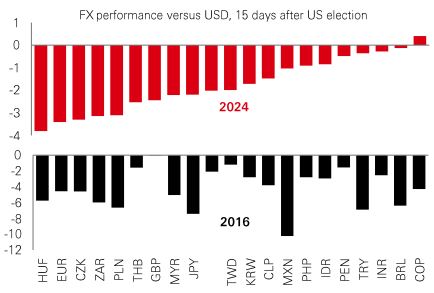
Past performance does not predict future returns. The level of yield is not guaranteed and may rise or fall in the future. For informational purposes only and should not be construed as a recommendation to invest in the specific country, product, strategy, sector or security. Any views expressed were held at the time of preparation and are subject to change without notice.
Source: HSBC Asset Management. Macrobond, Bloomberg, Datastream. Data as at 7.30am UK time 22 November 2024.
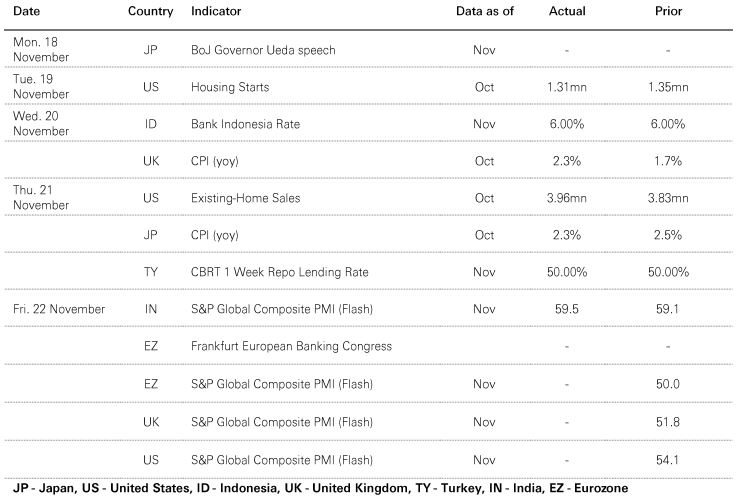
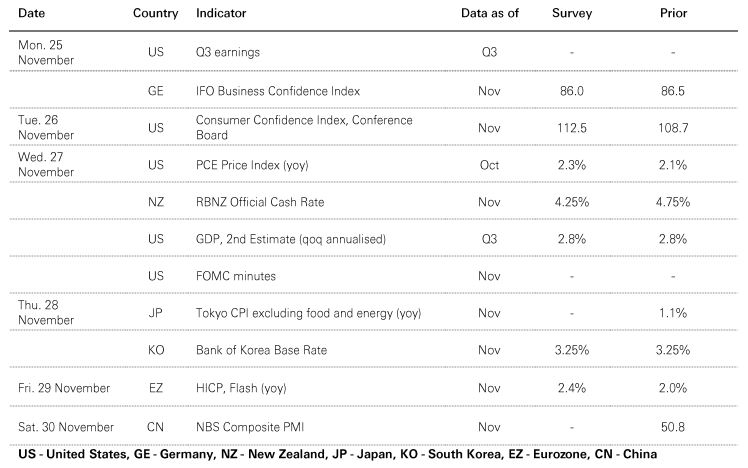
Source: HSBC Asset Management. Data as at 7.30am UK time 22 November 2024. For informational purposes only and should not be construed as a recommendation to invest in the specific country, product, strategy, sector or security. Any views expressed were held at the time of preparation and are subject to change without notice.
Risk markets were resilient despite heightened geopolitical tensions, with both oil and gold prices rallying. The US DXY dollar index paused for breath after its recent strong run. Core government bonds consolidated ahead of key US inflation data and mixed comments from Fed officials. US equities saw a broad-based rally as investors digested Q3 earnings. The Euro Stoxx index fell modestly, while Japan’s Nikkei 225 weakened as the yen rebounded versus the US dollar. BoJ governor Ueda reiterated his commitment to gradual rate hikes. Emerging market stock markets were mixed. The Shanghai Composite and Hang Seng indices finished the week lower, but the tech-driven South Korea Kospi index performed well. India’s Sensex index fell further. In Latin America, Brazil’s Bovespa and Mexico’s IPC equity indices were on the defensive. Meanwhile, copper was little changed.





This document or video is prepared by The Hongkong and Shanghai Banking Corporation Limited (‘HBAP’), 1 Queen’s Road Central, Hong Kong. HBAP is incorporated in Hong Kong and is part of the HSBC Group. This document or video is distributed and/or made available, HSBC Bank (China) Company Limited, HSBC Bank (Singapore) Limited, HSBC Bank Middle East Limited (UAE), HSBC UK Bank Plc, HSBC Bank Malaysia Berhad (198401015221 (127776-V))/HSBC Amanah Malaysia Berhad (20080100642 1 (807705-X)), HSBC Bank (Taiwan) Limited, HSBC Bank plc, Jersey Branch, HSBC Bank plc, Guernsey Branch, HSBC Bank plc in the Isle of Man, HSBC Continental Europe, Greece, The Hongkong and Shanghai Banking Corporation Limited, India (HSBC India), HSBC Bank (Vietnam) Limited, PT Bank HSBC Indonesia (HBID), HSBC Bank (Uruguay) S.A. (HSBC Uruguay is authorised and oversought by Banco Central del Uruguay), HBAP Sri Lanka Branch, The Hongkong and Shanghai Banking Corporation Limited – Philippine Branch, HSBC Investment and Insurance Brokerage, Philippines Inc, and HSBC FinTech Services (Shanghai) Company Limited and HSBC Mexico, S.A. Multiple Banking Institution HSBC Financial Group (collectively, the “Distributors”) to their respective clients. This document or video is for general circulation and information purposes only.
The contents of this document or video may not be reproduced or further distributed to any person or entity, whether in whole or in part, for any purpose. This document or video must not be distributed in any jurisdiction where its distribution is unlawful. All non-authorised reproduction or use of this document or video will be the responsibility of the user and may lead to legal proceedings. The material contained in this document or video is for general information purposes only and does not constitute investment research or advice or a recommendation to buy or sell investments. Some of the statements contained in this document or video may be considered forward looking statements which provide current expectations or forecasts of future events. Such forward looking statements are not guarantees of future performance or events and involve risks and uncertainties. Actual results may differ materially from those described in such forward-looking statements as a result of various factors. HBAP and the Distributors do not undertake any obligation to update the forward-looking statements contained herein, or to update the reasons why actual results could differ from those projected in the forward-looking statements. This document or video has no contractual value and is not by any means intended as a solicitation, nor a recommendation for the purchase or sale of any financial instrument in any jurisdiction in which such an offer is not lawful. The views and opinions expressed are based on the HSBC Global Investment Committee at the time of preparation and are subject to change at any time. These views may not necessarily indicate HSBC Asset Management‘s current portfolios’ composition. Individual portfolios managed by HSBC Asset Management primarily reflect individual clients’ objectives, risk preferences, time horizon, and market liquidity.
The value of investments and the income from them can go down as well as up and investors may not get back the amount originally invested. Past performance contained in this document or video is not a reliable indicator of future performance whilst any forecasts, projections and simulations contained herein should not be relied upon as an indication of future results. Where overseas investments are held the rate of currency exchange may cause the value of such investments to go down as well as up. Investments in emerging markets are by their nature higher risk and potentially more volatile than those inherent in some established markets. Economies in emerging markets generally are heavily dependent upon international trade and, accordingly, have been and may continue to be affected adversely by trade barriers, exchange controls, managed adjustments in relative currency values and other protectionist measures imposed or negotiated by the countries with which they trade. These economies also have been and may continue to be affected adversely by economic conditions in the countries in which they trade. Investments are subject to market risks, read all investment related documents carefully.
This document or video provides a high-level overview of the recent economic environment and has been prepared for information purposes only. The views presented are those of HBAP and are based on HBAP’s global views and may not necessarily align with the Distributors’ local views. It has not been prepared in accordance with legal requirements designed to promote the independence of investment research and is not subject to any prohibition on dealing ahead of its dissemination. It is not intended to provide and should not be relied on for accounting, legal or tax advice. Before you make any investment decision, you may wish to consult an independent financial adviser. In the event that you choose not to seek advice from a financial adviser, you should carefully consider whether the investment product is suitable for you. You are advised to obtain appropriate professional advice where necessary.
The accuracy and/or completeness of any third-party information obtained from sources which we believe to be reliable might have not been independently verified, hence Customer must seek from several sources prior to making investment decision.
The following statement is only applicable to HSBC Mexico, S.A. Multiple Banking Institution HSBC Financial Group with regard to how the publication is distributed to its customers: This publication is distributed by Wealth Insights of HSBC México, and its objective is for informational purposes only and should not be interpreted as an offer or invitation to buy or sell any security related to financial instruments, investments or other financial product. This communication is not intended to contain an exhaustive description of the considerations that may be important in making a decision to make any change and/or modification to any product, and what is contained or reflected in this report does not constitute, and is not intended to constitute, nor should it be construed as advice, investment advice or a recommendation, offer or solicitation to buy or sell any service, product, security, merchandise, currency or any other asset.
Receiving parties should not consider this document as a substitute for their own judgment. The past performance of the securities or financial instruments mentioned herein is not necessarily indicative of future results. All information, as well as prices indicated, are subject to change without prior notice; Wealth Insights of HSBC Mexico is not obliged to update or keep it current or to give any notification in the event that the information presented here undergoes any update or change. The securities and investment products described herein may not be suitable for sale in all jurisdictions or may not be suitable for some categories of investors.
The information contained in this communication is derived from a variety of sources deemed reliable; however, its accuracy or completeness cannot be guaranteed. HSBC México will not be responsible for any loss or damage of any kind that may arise from transmission errors, inaccuracies, omissions, changes in market factors or conditions, or any other circumstance beyond the control of HSBC. Different HSBC legal entities may carry out distribution of Wealth Insights internationally in accordance with local regulatory requirements.
Important Information about the Hongkong and Shanghai Banking Corporation Limited, India (“HSBC India”)
HSBC India is a branch of The Hongkong and Shanghai Banking Corporation Limited. HSBC India is a distributor of mutual funds and referrer of investment products from third party entities registered and regulated in India. HSBC India does not distribute investment products to those persons who are either the citizens or residents of United States of America (USA), Canada, Australia or New Zealand or any other jurisdiction where such distribution would be contrary to law or regulation.
The following statement is only applicable to HSBC Bank (Taiwan) Limited with regard to how the publication is distributed to its customers: HSBC Bank (Taiwan) Limited (“the Bank”) shall fulfill the fiduciary duty act as a reasonable person once in exercising offering/conducting ordinary care in offering trust services/ business. However, the Bank disclaims any guarantee on the management or operation performance of the trust business.
The following statement is only applicable to PT Bank HSBC Indonesia (“HBID”): PT Bank HSBC Indonesia (“HBID”) is licensed and supervised by Indonesia Financial Services Authority (“OJK”). Customer must understand that historical performance does not guarantee future performance. Investment product that are offered in HBID is third party products, HBID is a selling agent for third party product such as Mutual Fund and Bonds. HBID and HSBC Group (HSBC Holdings Plc and its subsidiaries and associates company or any of its branches) does not guarantee the underlying investment, principal or return on customer investment. Investment in Mutual Funds and Bonds is not covered by the deposit insurance program of the Indonesian Deposit Insurance Corporation (LPS).
Important information on ESG and sustainable investing
Today we finance a number of industries that significantly contribute to greenhouse gas emissions. We have a strategy to help our customers to reduce their emissions and to reduce our own. For more information visit www.hsbc.com/sustainability.
In broad terms “ESG and sustainable investing” products include investment approaches or instruments which consider environmental, social, governance and/or other sustainability factors to varying degrees. Certain instruments we classify as sustainable may be in the process of changing to deliver sustainability outcomes. There is no guarantee that ESG and Sustainable investing products will produce returns similar to those which don’t consider these factors. ESG and Sustainable investing products may diverge from traditional market benchmarks. In addition, there is no standard definition of, or measurement criteria for, ESG and Sustainable investing or the impact of ESG and Sustainable investing products. ESG and Sustainable investing and related impact measurement criteria are (a) highly subjective and (b) may vary significantly across and within sectors.
HSBC may rely on measurement criteria devised and reported by third party providers or issuers. HSBC does not always conduct its own specific due diligence in relation to measurement criteria. There is no guarantee: (a) that the nature of the ESG / sustainability impact or measurement criteria of an investment will be aligned with any particular investor’s sustainability goals; or (b) that the stated level or target level of ESG / sustainability impact will be achieved. ESG and Sustainable investing is an evolving area and new regulations are being developed which will affect how investments can be categorised or labelled. An investment which is considered to fulfil sustainable criteria today may not meet those criteria at some point in the future.
THE CONTENTS OF THIS DOCUMENT OR VIDEO HAVE NOT BEEN REVIEWED BY ANY REGULATORY AUTHORITY IN HONG KONG OR ANY OTHER JURISDICTION. YOU ARE ADVISED TO EXERCISE CAUTION IN RELATION TO THE INVESTMENT AND THIS DOCUMENT OR VIDEO. IF YOU ARE IN DOUBT ABOUT ANY OF THE CONTENTS OF THIS DOCUMENT OR VIDEO, YOU SHOULD OBTAIN INDEPENDENT PROFESSIONAL ADVICE.
© Copyright 2024. The Hongkong and Shanghai Banking Corporation Limited, ALL RIGHTS RESERVED.
No part of this document or video may be reproduced, stored in a retrieval system, or transmitted, on any form or by any means, electronic, mechanical, photocopying, recording or otherwise, without the prior written permission of The Hongkong and Shanghai Banking Corporation Limited.